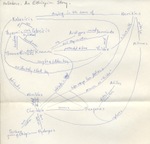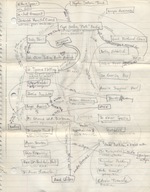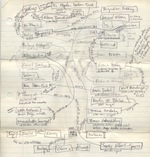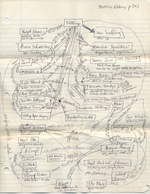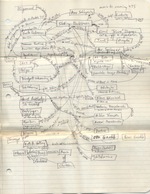
. . . is to run off leash after 5pm on weekdays in the Nethermead of Brooklyn’s Prospect Park. He used to be able to, but the Park has recently changed its policy. More info here. If you live in Brooklyn, please consider signing the petition to restore weekday evenings off-leash in the Nethermead. Thanks!
How Is the Internet Changing Literary Style?
[On 10 June 2008, the journal n+1 sponsored a debate under the title “The Internet: We All Live There Now,” at the Kitchen. The panelists were Mark Greif, Moe Tkacik, Ben Kunkel, and me; Keith Gessen was the moderator. Here’s a transcript of my talk.]
Good evening. In my talk tonight, I would like to raise the question, How is the internet changing literary style? The question has at least two aspects. First, Which traits of style change when writing goes online? Second, What are the forces that cause these changes to come about? There is a third aspect, a moral one, which I will try to defer answering until the end of my talk but which shadows the first two, namely, Are these changes an improvement?
There are so many different styles of writing online that my description can’t help but be impressionistic and subjective. Precisely because of that abundance and variety, however, there may be no other way to proceed, so, with your indulgence, here goes.
There is relatively little fiction and poetry online, by which I mean, fiction and poetry that is native to that environment, written with the intention of being read there. This is puzzling. Whatever the sickliness of poetry as a genre, fiction is one of the most robust and profitable forms of printed literature. An inkling of an answer occurred to me not long ago while I was reading the opening pages of Philip Larkin’s novel Jill. In the book’s first scene, Larkin describes an awkward boy taking the train to college for the first time. The boy’s mother has packed him sandwiches, but he’s embarrassed to eat before strangers, so he secretly crams one down his throat in the train restroom and flushes the rest down the toilet, only to discover, when he returns to his seat, that his fellow passengers have all taken out their lunches.
The précis I’ve just given compresses the action of several pages into several sentences, and thereby makes the prose sound more eventful than it is. What struck me when I read it was how wonderfully calm it is. It makes no effort to seize the reader’s attention. It assumes, rather, that the reader has taken the risk of extending his attention unsolicited, almost as a gift, which the novelist will do his best to repay by the quiet and steady work of elaborating a world and the way that one character sees it.
The internet is inhospitable to that kind of quietness. If your browser were to happen on such a page, your eyes would likely go blank with impatience. Who is this guy? Why aren’t there any links? And, more damningly, Is anyone else reading this? A text on the internet rarely takes for granted your decision to read it or to continue reading it. There is often, instead, a jazzy, hectoring tone. At home my boyfriend and I use a certain physical gesture as shorthand to describe it. To make it, extend your index fingers and your thumbs so that your hands resemble toy pistols. Then waggle them before you, like a dude in a cheesy Western, while you wink, dip your knees, and lopsidedly drawl, “Heyyy.” The internet is always saying, “Heyyy.” It is always welcoming you to the party; it is always patting you on the back to congratulate you for showing up. It says, You know me, in a collusive tone of voice, and Wanna hear something funny? and Didja see who else is here? This tone is not absent from print; in fact, no page of New York magazine is without it. Certain decorative effects in language may be compatible with it, but it seems to be toxic to imagination.
What styles do thrive on the internet? I’ve kept a blog for several years, and although its readership is tiny, I of course notice when the hits rise and fall. I seem to get more readers when I post frequently, when I write about people or topics in the headlines, when I have been drawn into a conflict, and when I write something that speaks to a self-image that a group of people share. Over the years I’ve gradually revealed more personal details; I still reveal very little, comparatively, but enough to entitle me to say that I feel a tug there, too. Perhaps the tugs that I feel are a better data source, come to think of it, than my blog’s underemployed hit counter. If I were to interpret those tugs, I would say that writing on the internet tends to be more popular when it satisfies the reader’s wish to be connected—the wish not to miss out. The writer, too, may have such a wish. I admit that I love it when another blog links to mine; there is great consolation in the feeling of having a posse. And of course many readers online are also writers there. Perhaps these feelings of “groupiness” explain a few more traits of internet style. There is a greater tolerance online for sloppy and inexact writing—not merely for typos but for a generalized kludginess of thought, especially the errors that the usage stickler H. W. Fowler named “haziness,” “swapping horses,” and “unequal yokefellows,” which may all be loosely described as changing your mind about the grammatical structure of a sentence halfway through writing it—and such tolerance is to be expected if people are reading primarily for the sake of a feeling of belonging. One also finds more flattery and more insults online, another hint that online readers are more interested in affiliation and in the feelings associated with including and excluding other people.
This willingness in readers to overlook form raises a question as to whether online writing entertains, in the traditional sense of the word. I am not sure that it does. Reading online does not seem to me to be a pleasure in itself but a response to irritation. That is, it is not like eating an ice cream cone; it is like scratching an itch. I am only reporting on my own feelings here, of course, but while I am doing so, let me report a further kink in them. Between us, my boyfriend and I subscribe to more than a dozen magazines, and if I pick one up, I know instantly that I am goofing off. Online reading, however, fails to set off my leisure detection system. Part of the failure may be perceptual—online reading takes place while I’m sitting in front of my laptop, immobilized, as I am when working. But I think, too, that online writing may, even in its supposedly silly moments, be covertly work-like: there is a fair amount of tedium in its unedited prose. Many of the jokes and references are only comprehensible to regular visitors. No one, my hit counter tells me, reads blogs on the weekend. And reading online prose is not refreshing. An action movie leaves the viewer juiced; a novel may leave the reader wistful. But reading blogs, in my experience, leaves me more addled and nervous than when I began. This work-like character makes the internet particularly corrosive , by the way, to the productivity of those who work at home, such as writers. Through web browsing, the freelancer communes with the procrastinating office drone—at his peril, because the freelancer receives no weekly paycheck.
By this point, you will have gathered from my references to feelings and to social context that the definition of literary style that I’m working with is broad. I suppose I define it as the way a writer expresses himself in words, and I would defend the breadth of my definition by arguing that whenever a writer expresses himself he also chooses how he will present himself—even if he chooses to keep his personal self out of view, insofar as that is possible. A writer is someone who has turned his self-presentation in language into an art or a profession, just as an actor has his self-presentation in person. Feelings and social context—or rather, linguistic effects that suggest feelings and social context—may be as crucial to a writer as metaphor and diction.
In defining style this way, I am borrowing from the sociologist Erving Goffman’s 1959 book The Presentation of Self in Everyday Life. It was Goffman’s insight that in their structure, many daily encounters are a milder version of the one that we are acting out here tonight. There are usually two teams—tonight, for instance, it’s the panelists up here vs. the audience out there. Each team performs for the other. Each side tries to define the situation that they find themselves in, to their advantage by conveying an impression. Up here, we’re trying to seem thoughtful but not too pompous; out there, you’re trying to seem interested but not naïve. You may also, by the way, be performing for one another, as may we. Our tools up here include our words, our facial expressions, and our clothes, and every sign we give, or inadvertently give off, has, according to Goffman, “a promissory character.” In other words, while we speak, you’re going to be trying to decide whether we live up to the promise our words and manner imply. If we’re unlucky or unskillful, you may decide we’re pretending to be something we’re not. Thankfully, we’re not always onstage, laboring under the stress of maintaining what Goffman calls our “front.” Last night, some of my fellow panelists and I met for a private dinner, to strategize in a place where you wouldn’t be able to hear us. At that dinner, I could have safely listed all the many books about the internet I haven’t read; alerted to my deficiencies, my comrades would then know to steer questions about them away from me tonight, without any need for me to give a signal and without you in the audience being any the wiser. Goffman calls such spaces “back regions,” or, more colloquially, “backstage areas.”
Recourse to a backstage area is only one of a number of techniques by means of which performers may make the task of self-presentation more manageable. Another is “audience segregation.” Audience segregation is why professors say they won’t go on Facebook: they work hard to project a sage and stolid persona to their students, and the effort would be undermined if their students were to see them zombie-biting the assistant dean. Another is what Goffman calls “mystification,” which is in essence a limitation on contact. The professor is too busy to talk to you; come to his office hours if you must. Still another is “dramaturgical circumspection,” which involves managing the kind of audience you have and how much they know. If the professor plans to crib all his lectures next semester from M. H. Abrams’s The Mirror and the Lamp, perhaps he’ll choose to leave that book off the syllabus, and suggest to better-read students that the class will be too easy for them. Finally, performers are protected from a public loss of face by the audience’s tact, that is, by the audience’s willingness to overlook lapses in order to avoid a scene. This may be another reason professor don’t join Facebook: They know their students let their guard down there, and for the students’ sake they’d rather not see it.
All of these techniques are rendered more difficult, if not impossible, by the Internet, as the example of Facebook suggests. Some professors, after all, do join. It’s impossible to keep the members of the right-wing discussion group Free Republic dot-com from reading the posts at My Barack Obama dot-com, and vice versa. The internet’s killer app, as the onetime internet mogul Michael Wolff once said, is eavesdropping. It’s impossible to screen one’s audience, and almost impossible to release information about oneself selectively. Mystification, too, is often punctured online; it’s difficult to prevent people from expecting a prompt reply to an email. As for tact, it isn’t rarer on the internet, but in real life, tact is efficacious largely because audience members police one another to see that it’s maintained. Hecklers are hissed down. Thanks to anonymity, the odds of being punished for failing to use tact online are low to nonexistent, and so whenever an opportunity for discrediting a performer arises, someone will come along cheap enough to take it. Just the other day, for example, I posted on my blog a recipe for rice and beans that I cooked when I was in graduate school, as part of an inter-blog conversation about such recipes, only to have “ddd@eee.net” declare, “Sorry, but this recipe doesn’t even meet the basic requirements of a grad school recipe.”
Against a more scurrilous attack, my friend Scott McLemee once invoked Goffman to describe his blog Quick Study as his “backstage area.” Scott asserted that in such a setting it was tactless to be so harsh. I agree that such harshness was and is tactless, but I disagree with Scott about his application of Goffman. I think that in fact there are no backstage areas online. On the internet, everything is a front, yet the stress and strain of maintaining a constant and universal front is so great that many performers on the internet make a show of abandoning the standards conventionally associated with a front. On the internet, the audience is with you too often, and sees you from too many angles, for you to pull any wool over their eyes, so the safest way to present yourself is by underselling. No intimacy comes with this deshabille, however. The environment remains dangerous. One skips through no-man’s-land in one’s pyjamas, as it were. If we live on the internet, as Keith suggested by the title he chose for tonight’s event, then we keep ourselves as slovenly there as if we were backstage, yet feel as isolated and as trapped within our shells as if we were in front of the footlights.
Here, I think, we reach the question of whether these changes in style constitute an improvement. In purely formal terms, I think they don’t. Writing is not refined by a conscious or half-conscious effort to look sloppy. The moral aspect is more complicated. Goffman writes that when a performer is publicly discredited, “the members of the audience may discover a fundamental democracy that is usually well hidden.” That sounds like a boon, but it may be worth keeping in mind that the most powerful CEOs and politicians in America not only do not blog, they do not even use email. There is accordingly a limit to the internet’s revolutionary potential. Also, it is possible we might come to regret that the front of an institution like the New York Times has been riddled by the internet’s fire. According to Goffman, a team of performers maintains boundaries between itself and its audience so that its members may have the flexibility to share information among themselves without giving it away to the audience. A paranoid or a utopian may believe the New York Times doesn’t need to keep secrets from its readers, but most people think it’s possible to report responsibly using anonymous sources, and as Goffman tried to demonstrate, every public presentation of self requires a touch of razzle-dazzle to succeed. Even the Gray Lady may occasionally need a spot of rouge.
To speak still more abstractly: I’m not sure I believe in leveling for its own sake, and I don’t want to live in a society where I may not shut the door. “Estrangement shows itself precisely in the elimination of distance between people,” Theodor Adorno wrote in Minima Moralia.
For only as long as they abstain from importuning one another with giving and taking, discussion and implementation, control and function, is there space enough between them for the delicate connecting filigrees of external forms in which alone the internal can crystallize.
It may be that communication is compromised when interactions are completely public, that grabbing attention often substitutes for deserving it, and that solitude is more refreshing than a company in which trust and tenderness are habitually threatened. As the etiquette books explain, an informal style signals warmth to friends and family, but it’s rude to use it with strangers.
Slow learner
I was not a terribly casual young person. When I was about twenty-two, I saw in a Cambridge bookstore an edition of Collected Ancient Greek Novels. It seemed they were the earliest novels ever written. Since I wanted to write novels myself someday, I felt that I ought to purchase and read it. Unfortunately, the earliest novels ever written were not the best, by a long shot. They were meandering, melodramatic, and improbable. I don’t remember how many of the nine novels in the volume I read, because I don’t remember a word of any of them today. But there is incontrovertible evidence that I did read at least one, “An Ethiopian Story” by Heliodorus. I diagrammed it.
Ah, the earnestness of youth! I was just out of college, and I hadn’t yet determined on grad school, but I heard the call of note-taking, even though no one was ever going to quiz me. Until this post, I’m pretty sure that the fact of my having read Heliodorus’ “Ethopian Story” was a dark secret safely kept; it’s not a title that comes up a lot in Brooklyn cocktail-party conversation.
But I should level with you. I’m just warming up the audience, here. This post isn’t really about Heliodorus at all. It’s really about Thomas Pynchon, and the five-page diagram, along the same lines but on a much more grandiose scale, that I drew while reading Gravity’s Rainbow. I think I drew the Pynchon diagrams a year or two before the Heliodorus one; as you will see if you dare to click, the Pynchon diagrams are a bit more passionate, if not outright mad. Today there are reader’s companions to Gravity’s Rainbow, but there weren’t at the time. I’m not sure the diagrams will be useful to any other readers, but they were useful to me back then, partly as a memory aid, but mostly in the way of channelling and venting what felt like a possession. If you haven’t read Gravity’s Rainbow, and you wish you knew the human intermediaries that connect “Grigori (octopus)” to “Milton Gloaming (statistician)”; or if you happen to be in the midst of reading the novel, and it would help to be reminded that “Geli Tripping (balalaika, witch)” is in the harem of “Vaslav Tchitcherine”; or if you just want to admire the way all the lines converge on Slothrop—then by all means knock yourself out.
Thoreau, Adorno, and Bonhoeffer on the Internet
For the talk I gave about the Internet at the n+1 panel on Tuesday night, I brainstormed by collecting quotes. I only ended up using one of them, and now have on hand a relatively unused miniature commonplace book about the Internet. Well, not exactly about the Internet, because it didn’t exist when most of the writers below wrote. They were in fact concerned with such topics as readerly hygiene in the face of textual surfeit and the threat that mass culture poses to the hierarchies that traditionally defended intellectual and artistic labor. Close enough for my purposes. Emphases added.
Samuel Johnson, as quoted in Boswell’s Life, 1778:
Virgil is less talked of than Pope, and Homer is less talked of than Virgil; but they are not less admired. We must read what the world reads at the moment. It has been maintained that this superfoetation, this teeming of the press in modern times, is prejudicial to good literature, because it obliges us to read so much of what is of inferiour value, in order to be in the fashion; so that better works are neglected for want of time, because a man will have more gratification of his vanity in conversation, from having read modern books, than from having read the best works of antiquity. But it must be considered, that we have now more knowledge generally diffused. . . .
Henry D. Thoreau, A Week on the Concord and Merrimack Rivers, 1849:
It would be worth the while to select our reading, for books are the society we keep; to read only the serenely true; never statistics, nor fiction, nor news, nor reports, nor periodicals, but only great poems, and when they failed, read them again, or perchance write more. . . . Read the best books first, or you may not have a chance to read them at all. . . . Certainly we do not need to be soothed and entertained always like children. He who resorts to the easy novel, because he is languid, does no better than if he took a nap.
Henry D. Thoreau, Walden, 1854:
. . . there is an illusion about [modern improvements]; there is not always a positive advance. . . . They are but improved means to an unimproved end. . . . We are in great haste to construct a magnetic telegraph from Maine to Texas; but Maine and Texas, it may be, have nothing important to communicate. Either is in such a predicament as the man who was earnest to be introduced to a distinguished deaf woman, but when he was presented, and one end of her ear trumpet was put into his hand, had nothing to say. As if the main object were to talk fast and not to talk sensibly. We are eager to tunnel under the Atlantic and bring the old world some weeks nearer to the new; but perchance the first news that will leak through into the broad, flapping American ear will be that the Princess Adelaide has the whooping cough.
Dietrich Bonhoeffer, “After Ten Years: A Reckoning Made at New Year 1943”:
Unless we have the courage to fight for a revival of wholesome reserve between man and man, we shall perish in an anarchy of human values. . . . Socially it means the renunciation of all place-hunting, a break with the cult of the “star,” an open eye both upwards and downwards, especially in the choice of one’s more intimate friends, and pleasure in private life as well as courage to enter public life. Culturally it means a return from the newspaper and the radio to the book, from feverish activity to unhurried leisure, from dispersion to concentration, from sensationalism to reflection, from virtuosity to art, from snobbery to modesty, from extravagance to moderation.
Theodor Adorno, Minima Moralia, 1951:
The fascinated eagerness to consume the latest process of the day not only leads to indifference towards the matter transmitted by the process, but encourages stationary rubbish and calculated idiocy. It confirms the old kitsch in ever new paraphrases as haute nouveauté.
George W. S. Trow, “In the Context of No-Context,” 1980:
The middle distance fell away, so the grid (from small to large) that had supported the middle distance fell into disuse and ceased to be understandable. Two grids remained. The grid of two hundred million and the grid of intimacy. Everything else fell into disuse. There was a national life—a shimmer of national life—and intimate life. The distance between these two grids was very great. The distance was very frightening. People did not want to measure it. People began to lose a sense of what distance was and of what the usefulness of distance might be.
Audacity of list-making
According to this morning’s New York Times, three Harvard child psychiatrists were paid more than $1 million each by pharmaceutical companies between 2000 and 2007, and failed to report most of the payments to the university, as they were obliged to. The omissions were uncovered by Charles E. Grassley, a Republican senator from Iowa, who has sponsored legislation that might help to solve the problem: He proposes a national registry of payments to doctors by pharmaceutical companies. This sounds like a wonderful idea to me, but my first thought as I read the article was, Of course it’ll never happen. Over the last eight years, I’ve learned to hope for no more than the occasional quashing of a really pernicious innovation (Cf. the privatization of Social Security). On second thought, however, I realized that my pessimism is a trained response, and that I am capable of unlearning it. In fact, I could start unlearning it now, because the Bush administration is about to be canned. I seem, after all, to have been carrying around in my head a list of regulatory and legislative changes that I’ve been hoping the next administration would put into effect. Herewith, in the spirit of very amateur punditry, in no particular order:
- A national registry of payments, in cash and in kind, to doctors by pharmaceutical companies and medical-device manufacturers, to be made publicly accessible in a searchable online database.
- Health care reform. My own personal horror story, with a creepy postscript: A couple of years ago, I woke up at 3am with excruciating pain. It was midwinter, and sleet was coming down outside. Seeing me curled up on the floor howling as I have never howled before, Peter called 9-1-1, and an ambulance soon arrived and took me to a nearby emergency room. It turned out that I was passing a kidney stone. Months later, our insurer, Blue Cross Blue Shield of Illinois, refused to pay for the ambulance ride, which cost slightly less than $500. They weren’t trying to claim that I hadn’t needed an ambulance. They were claiming that the ambulance I rode in was an out-of-network provider. I called them up and asked whether, as an Illinois-based company, they considered any ambulances in New York City to be in-network providers, because if they didn’t, they had no right to be offering insurance to companies located here. Oh yes, they said, they did have New York City ambulances in their network. Just not the one that took me. The name of the fly-by-night ambulance service I used? The Fire Department of New York. I tried arguing, in my appeal, that Peter wasn’t at 3am in any mental state to sort through which ambulance providers were in and out of network, that it probably wouldn’t have been medically appropriate to take the time to do that anyway, and that it wasn’t at all clear to me that New York City 9-1-1 operators let you specify which ambulance will come pick you up. They didn’t buy it; I had to pay out of pocket. Fast forward to 2008, when the city is considering a new program to send special ambulances to pick up people who’ve just died, so their organs will reach the hospital fresher (more on the concept here). A University of Pennsylvania bioethicist explained to the New York Times a potential objection:
“There are a lot of Americans who have a hard time getting into a hospital because they don’t have insurance or they have poor insurance,” Dr. Caplan noted. “They will not necessarily find it a good thing when they find out that they can’t get into the hospital, but that a hospital will send a special ambulance to bring their body to the hospital when they’re dead.”
My case is less dramatic, because I had no trouble getting into the emergency room and didn’t die. Still, if I had died, and such a program had been in operation, the ambulance would have been paid for. To make an unnecessarily long story short: The morality of not providing for health care for everyone will become more and more dodgy as medicine advances into such domains as high-speed organ recycling.
- A ban on the sale of sweetened drinks (including juices) and candy from all schools, and a ban on advertising food to children in print or on television.
- A national bully-pulpit campaign to urge energy conservation.
- The elimination of ethanol subsidies, because the math doesn’t add up on growing corn with natural-gas-produced artificial fertilizers in order to make a gasoline substitute. It’s an agribusiness boondoggle.
- The reform of U.S. farm policy generally. Drastic reform, if not elimination, of subsidies for corn, wheat, and soybeans. Failing that, support for the cultivation of fruits and vegetables at levels comparable to the support for commodity crops.
- A continued acceleration of fuel-efficiency standards for cars and trucks.
- A national commission to investigate all acts of torture perpetrated by U.S. agents or at their behest since 2001, to be modeled on the 9/11 Commission, with borrowings from South Africa’s Truth and Reconciliation Commission as necessary.
- The repeal of the Military Commissions Act, the shuttering of Guantánamo Bay and all secret U.S.-run prisons abroad, the end of the practice of rendition, and the closure of the military tribunal alternative justice system. The restoration of habeas corpus.
- The taxation of carbon.
- An end to obstruction by the Environmental Protection Agency, which should be enforcing laws that require coal-burning fuel plants to reduce their mercury emissions.
- More and safer bike lanes.
- The establishment of a national Financial Product Safety Commission, so that people may feel as confident when taking out a credit card or a mortgage as they do when buying a toaster.
- A Bill of Rights for non-citizens. Sixty-six immigrants died in detention between 2004 and 2007, according to the New York Times, which recently reported on one of them, Boubacar Bah, “a 52-year-old tailor from Guinea who had overstayed a tourist visa.” Bah suffered a head injury in detention, and when he came to, he yelled in his native language and threw up. His guards decided he was a “behavior problem,” put him in shackles, and took him to solitary confinement. His family didn’t hear of the accident until four days later, by which time he was in a coma, from which he never emerged.
- The repeal of the Defense of Marriage Act.
- Canadian-style packaging on cigarettes.
- An end to state-run lotteries, which are a tax on the poor. Yes, many of them give a portion of their income to state arts agencies, but that’s not a good thing: it’s a blatant and for some reason not transparent effort to buy the compliance of the intellectual class.

